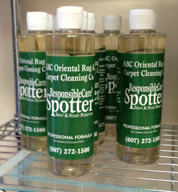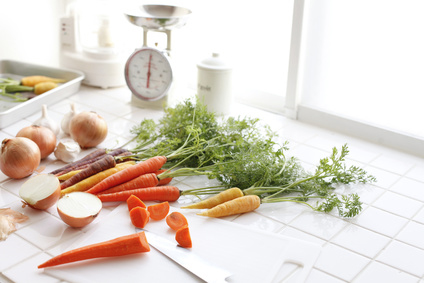SHOULD WE WASH
FRUITS and VEGGIES
BEFORE COOKING OR EATING?
Should we wash fruits and veggies before cooking or eating? This is a very good question. We, as consumers, have been advised to be wary of many of the fruits and vegetables we buy at the local supermarket mainly because of the wide variety of pesticides, some possibly toxic, that may have remained behind as residues on the produce after harvest.
Actually, each year approximately one in ten people gets ill by eating unsafe food and approximately 46% of these cases of food-borne illness come from eating fruit and vegetables!
The fact is that most fresh produce is grown in the open where anyone or anything can touch it. The results could be that unwashed produce may contain a variety of potentially harmful matter, not only dirt, but also bacteria, fungi, viruses, and pesticides.
It is also entirely possible that fresh produce may also become contaminated during packaging, preparation or storage.
WHAT ARE WE TO DO ABOUT THIS?
Obviously, we cannot stop eating fruits and vegetables! The health benefits of eating these foods may outweigh the risks of pesticide exposure but we still need to lower that risk as much as possible, especially for our children and older adults.
It is a good idea to wash organic produce as well, since it is not always clear if the produce has really been grown without any pesticides at all.
So, washing fruits and vegetables is of real safety importance. But the question is, what is the best way to do this?
(Please note: Be aware washing only removes pesticides, dirt, and bugs on the surface, not those that have seeped below the skin.)
COMMERCIAL SPRAYS OR HOMEMADE SPRAYS & SOAKS TO
WASH FRUITS and VEGGIES?
A plethora of ‘organic fruit and veggie sprays’ can be found in the market today and homemade do-it-yourself sprays and soak recipes can be found all over the Internet.
Studies have been done that suggest just rinsing in cold water can remove most pesticides. But for those of us who want to be sure we are getting as much of the pesticides as well as bugs and dirt out when we wash fruits and veggies (whether organic or non-organic), DIY homemade sprays and soaks that are easy and inexpensive to make would seem to be a good option. If you should prefer store-bought sprays, be sure to read the ingredients carefully to avoid unwanted chemicals.
EXAMPLES OF
HOMEMADE SPRAY & SOAK METHODS TO WASH FRUITS and VEGETABLES
Here are some recipes that can not only clean the produce, but some may also help the produce to stay fresh and crisp longer. (See CAVEATS in next section).
SPRAY #1:
- 1 tablespoon fresh lemon juice
- 1 tablespoon baking soda
- 1 cup water
Put all ingredients into a spray bottle (it will foam) and shake gently to mix.
Spray on produce, allow to sit for 2-5 minutes, then rinse under cold water.
SPRAY #2
- 1 cup water
- 1 cup vinegar
- 1 tablespoon baking soda
- 20 drops grapefruit seed extract (optional and a natural antibacterial which can be found in health-food stores or the health-food section of a supermarket).
Spray on produce, allow to sit for 2-5 minutes, then rinse under cold water.
SOAK:
- ¼ cup vinegar
- 2 tablespoons salt
Clean your sink or use a clean bowl and fill it with cold water. Add in vinegar and salt and swish around with your hands. Place produce in and let soak for approximately 3 minutes. You will find this soak will draw out bugs, dirt, and even some wax as well. Rinse thoroughly with cold water. You can leave harder skinned veggies in for up to 15 minutes.
CAVEATS WHEN WASHING FRUITS & VEGGIES...
- First, make sure your hands are clean (or use disposable gloves).
- The simplest and easiest procedure is to wash produce under cold running water while rubbing the fruits and veggies with your hands to remove dirt, pesticides, and some surface germs. Wash until the surface no longer looks dirty.
- Never wash produce with detergent or bleach, as the skin of some fruits and vegetables are porous and could absorb these chemicals. This could not only change their taste and texture but possibly make them unsafe to eat.
- If using a soaking method, it would be better to use a clean bowl as a sink could be full of germs.
- If using vinegar for a soaking method, use distilled malt, cider or wine vinegar and just half a cup of vinegar per cup of water. Soak the produce while stirring occasionally for 2 to 3 minutes. Then rinse in fresh cold water for at least 1 minute. For soft fruits especially, when using vinegar, the acetic acid it contains may alter the taste and texture so don't soak longer than 2 to 3 minutes and rinse thoroughly.
- When using a soaking method with baking soda, use one teaspoon per cup of cold water to wash the produce. This will remove microbes and pesticides without altering taste. Soak the fruits and vegetables in a clean bowl for 15 minutes, stirring occasionally. Remember that baking soda is an alkaline and soaking longer than 15 minutes and not rinsing thoroughly could break down the skins of delicate fruits and vegetables, affecting their texture and flavor.
SPECIAL WASHING PROCEDURES FOR SPECIFIC FRUITS & VEGGIES...
FRUITS:
- For stone fruits, apples and cucumbers, rinse in cold running water for up to a minute to remove dirt, microbes, and any wax coating.
- The high water content of cherries, grapes, strawberries, and other berries makes these fruits particularly perishable and wetting berries will increase the growth of any germs present and reduce their shelf life. These should be stored unwashed in the refrigerator, only washing when you are ready to eat them. Remove any spoiled or moldy berries before refrigerating them.
- Any fruits and vegetables you are not going to eat immediately should be blotted with a dry paper towel or put in a salad spinner to remove moisture and reduce germ growth. Then store in a closed container in the refrigerator.
- If you use plastic bags or containers, put a strip of dry paper towel in with the produce to absorb excess water. Replace daily.
VEGETABLES:
- Produce with a hard rind (such as squashes) or a firm skin (such as potatoes, sweet potatoes, and root vegetables) can be scrubbed with a vegetable brush until clean looking.
- Tomatoes should be rinsed under a tap water for around 30 seconds rubbing gently with your hands.
- To wash leafy green vegetables (such as lettuce, broccoli, cauliflower, kale or cabbage) separate them into leaves or florets and individually rinse under tap water, rubbing with your hands for up to a minute.
- Since lettuce is usually eaten uncooked, it is safer to discard damaged outer leaves as these are most likely to be contaminated with bacteria.
THE RISK OF LISTERIA IN PRODUCE
Food safety has gained a lot of attention lately, particularly due to the increase in foodborne illnesses. A common name that comes up in these conversations is Listeria monocytogenes, a type of bacteria that can lead to severe infections. Many wonder if it is possible to wash away Listeria. This is an important question that needs careful examination, given its impact on health and safety.
Listeria monocytogenes is a kind of bacteria that causes listeriosis, an infection that mainly impacts pregnant women, infants, elderly people, and those with compromised immune systems. What makes this bacterium stand out is its ability to survive in cold conditions, like those found in refrigerators. Unlike most other harmful germs, Listeria can grow even at temperatures as low as 32°F (0°C), which raises significant concerns for food safety.
Listeriosis symptoms can vary from mild flu-like feelings to serious issues such as meningitis or septicemia. Pregnant women are particularly vulnerable, as listeriosis can result in miscarriage, early delivery, or serious health problems for newborns. Because of these dangers, it's important to know how to safely manage all food, but in this article, we are concerned with the Listeria that can be found in fruits and vegetables.
CAN WASHING FRUITS AND VEGGIES REMOVE LISTERIA?
Research indicates that washing does lower the number of bacteria present on surfaces but may not eliminate them entirely. For example, washing lettuce lowers the levels of bacteria, yet some Listeria can still remain on the surface of the produce or be embedded within crevices where washing might not reach effectively. This suggests that although washing is helpful, it shouldn't be the only method we depend on for safety.
It is important be aware of any recalls about food safety, especially the presence of Listeria, wash your fruits and vegetables under cold water and make sure you store your fruits and vegetables safely, preferably in a refrigerator below 40 degrees F. to slow bacterial growth.
SUMMARY
Based on the body of evidence we currently have available today, water alone is still the best way to clean and remove pesticides from fresh produce. There may be no real advantage to using vinegar or baking soda or a store-bought spray (but it could make you feel better!)
It is also very important to pay attention to all food recalls and follow directions carefully.
Top of Wash Fruits and Veggies
"The Cleanest Clean You've Ever Seen."
by
ABC Oriental Rug & Carpet Cleaning Co.
130 Cecil Malone Drive Ithaca, NY 14850
607-272-1566

Vanessa Adams
Owner of ABC
130 Cecil Malone Drive Ithaca, NY 14850
For directions, Click Here.
OPEN:
Mon through Thur-8am to 5pm, Fri-8am to 4:30pm
Saturdays-10am to 1pm, except April & May and December & January.
ABC Oriental Rug is on Facebook!
We regularly post tips and information about your carpet, rugs, upholstery, and tile and grout so please visit us often.
We update our Facebook page with our latest discounts and we are also offering exclusive promotions to our Facebook fans. These are limited and short notice promotions.
When you like our page, you will also be able to claim your special gift from us!
"Like Us"
on Facebook
and find out
what's going on!

ABC
Carpet & Rug
Spotting Guide
Did you know that our ABC Responsible Care Spotter can get those pesky spots out of your carpet and will work equally as well on your clothes and upholstery?
Stop by our office and pick one up. They are $5.00 + Tax but if you have carpets or upholstery cleaned in your home or business, just request a free one from your Technician.
And don't forget to fill out the form above to download your free ABC Spotting Guide!

GIVE THE
GIFT OF CLEAN!

Why not think 'outside the box' and give
a Gift Certificate for professional carpet, upholstery, or tile
& grout cleaning from ABC for any special occasion!
Does a special person have a favorite area rug or oriental rug that needs cleaning or repair? Just give us a call. You'll make their day!
Bring in the mats from a car and we'll clean them as well.
Contact
us if you live in the Ithaca, NY or surrounding areas and we will
tailor a special gift certificate just for you for any Special Occasion.


